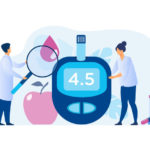Study shows young adults don’t easily transition to self-care of diabetes

Diabetes is challenging to manage at any age, but even more so for young adults who are handling the condition on their own for the first time. They need to transition from pediatric to adult care as smoothly as possible — but a recent study finds this isn’t happening.
Research led by Katharine Garvey, MD, MPH, director of Boston Children’s Diabetes Program, shows that routine outpatient care for type 1 diabetes often decreased between ages 16 and 24. At the same time, emergency room visits to treat the condition increased for that age group.
The study raises the concern that young adults across the country may lack a “medical home” with an endocrinologist and instead may be seeking routine care such as insulin prescription refills from an emergency department (ED), Garvey says. If anything, the research supports the idea that endocrinologists should have an integral role in diabetes management for young adults, she says, and illustrates how specialized care may prevent the need for acute care in hospitals.
Diabetes management is demanding
The daily management of type 1 diabetes can be overwhelming for young adults trying it on their own for the first time as they also balance education and work, Garvey says. Managed poorly, the condition can lead to poor glycemic control and trigger chronic vascular issues or complications such as a life-threatening increase in acidic ketones (diabetic ketoacidosis).
Aside from self-management, young adults must also transition from pediatric to adult diabetes care providers — and that’s where Garvey and her fellow researchers placed their focus. They studied health insurance claims data from 14,616 people, ages 16 to 24, with type 1 diabetes to assess where they received care: at the outpatient practice of an endocrinologist or primary care physician or at a hospital ED.
Outpatient treatment decreased, while hospital treatment jumped
The data showed that annual endocrinologist visits declined from 2.3 per year at age 16 to 1.5 per year by age 24. This data stands out, Garvey says, because previous research has shown endocrinologists are the main providers of type 1 diabetes care for most young adults with the condition.
Meanwhile, annual ED visits increased from 45 percent of 16-year-olds to 63 percent of 20-year-olds. That data aligns with findings from other studies that suggest young adults, regardless of condition, may be seeking routine care in the wrong setting. Conversely, those who had two or more endocrinologist visits a year were significantly less likely to have ED visits and hospitalizations.
A starting point to improving routine diabetic care
Garvey hopes the study can serve as a launching point for endocrinologists to assess how they can help young adults better manage type 1 diabetes and make a smooth transition to adult specialty care. “I’m interested how we can take the lessons from the research and implement them in a clinical care setting,” she says.
It’s also never too soon for parents to sit down with their teens and review prescriptions, insurance details, and other necessary steps toward where they will next receive primary care, she says. “Parents and diabetes care teams should work together to empower teens with the knowledge and skills they need to be successful in managing their diabetes.”
Contact the Division of Endocrinology to learn more about diabetes care or to refer a patient.
Related Posts :
-

Low-carb diets for diabetes: Rediscovering centuries-old wisdom
This year represents the 100th anniversary of the discovery of insulin, a hormone that regulates the amount of glucose, or ...
-

Signs of diabetes and other medical emergencies: Don’t delay care during the COVID outbreak
Merlin Ladd had been home from school for about six weeks when his parents started to notice that something was ...
-

Huge sequencing study links rare DNA changes to type 2 diabetes
Type 2 diabetes is a complicated disease influenced by genetics, lifestyle, and environment. Now, an international consortium of scientists has uncovered ...
-

Research 2022: Tackling disease in new ways
Researchers across Boston Children’s spent 2022 imagining new solutions to old challenges in health and medicine, opening the door to ...





